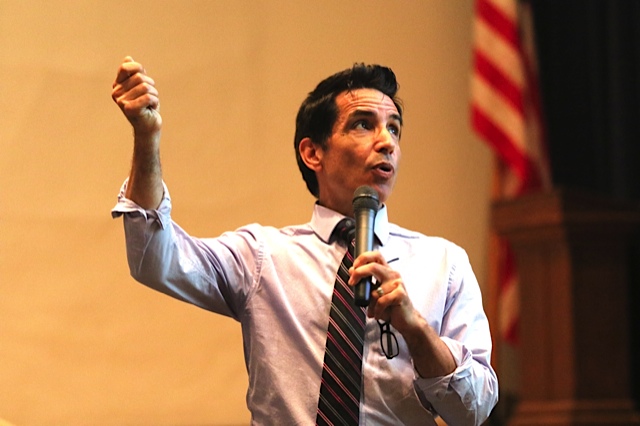Princeton Public Schools officials are keeping their options open in case their nearly $130 million facilities bond referendum is defeated in October, options that include having another referendum early next year.
In New Jersey, school districts can appeal to the state Commissioner of Education to override the outcome of an election after two defeats at the polls. For now, though, Princeton officials are eyeing the Oct. 2 vote for residents to decide a $129.6 million referendum that would pay to build a new school for fifth- and sixth-graders, increase the student capacity at overcrowded Princeton High School, and buy property, among other projects.
In terms of the next step, the Board of Education is scheduled to vote July 17 on whether to place a referendum before voters this fall.
With a month to go before that happens, Superintendent of Schools Stephen C. Cochrane held another town hall meeting on June 18, where he discussed the district’s plans, the costs involved and the needs he sees in his growing school district.
Speaking to an audience of residents at the John Witherspoon Middle School, he touched on familiar themes: enrollment is growing and projected to grow in the future. For example, Cochrane said the middle school has 727 students, exceeding the capacity of 626. Forecasts show that in two years there will be more than 850 students, he said.
“And then it goes up from there,” Cochrane said of projections that show 1,000 or more students in the middle school. “We need to do something soon for the students and teachers who will be occupying this particular space.”
At Princeton High School, the district is proposing to do $56.5 million worth of work, Cochrane showed in his presentation.
Cranbury, which has a send-receive relationship with Princeton which permits Cranbury residents of high school age to attend Princeton High School, would have to pay a portion of the interest on the debt of the high school projects, officials have said.
The amount Cranbury would pay or how its portion is calculated was not immediately available.
In terms of a tax impact, Cochrane showed that for the average home assessed at $837,074, residents would pay an extra $295 in 2020, an additional $294 in 2021, an extra $692 in 2022 and an additional $220 in 2023. The average increase, across the 30 years of the debt repayment, would be $53.49.
In an interview after his two-hour-presentation, Cochrane said he was “hopeful” the referendum would pass in October.
“But we go back, we look at the plans, we talk to the public and we resubmit,” Cochrane said when asked what the district would do if the referendum is defeated.
Under that scenario, he said, the district would look to have another referendum “within probably six months or so.”
“There are 700 to 800 students coming here in the next 10 years; we have to do something,” Cochrane said.
In New Jersey, voters do not have the final say, however. Janet Bamford, a spokeswoman for the New Jersey School Boards Association, outlined what state law allows if a referendum failed at the ballot box.
“However, if the referendum would have supported a ‘T&E’ capital project, one necessary to provide a ‘thorough and efficient’ education, as mandated by the New Jersey State Constitution, and it fails twice within a three-year period, a school district may apply to the Commissioner of Education to approve the issuance of bonds for the local share of the project,” Bamford said by email.
She said the most recent case of the commissioner overriding the results of a referendum occurred in 2016 in the Freehold Borough K-8 School District in Monmouth County.
Princeton officials would not close the door to that possibility should local voters reject two ballot questions.
“This is a community that has always supported education,” Cochrane said. “I’m going to continue to share information, to listen to feedback, to give people as much information as possible. And we’ll cross that bridge if we come to it. At this point, I’m just steering toward Oct. 2.”
“We haven’t thought that far ahead, because we have every expectation this referendum will pass,” board President Patrick Sullivan said by phone on June 19. “I believe this is a good plan.”

